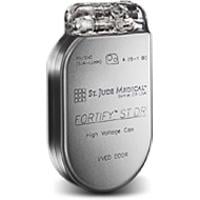
September 1, 2011 – St. Jude Medical Inc. announced the first insertion of an implantable cardioverter defibrillator (ICD) as part of a United States clinical study. The trial will examine the safety and effectiveness of an ST segment monitoring feature in the device.
The ST Monitoring to Detect ACS Events in ICD Patients (Analyze ST) study will evaluate effectiveness of the feature in the Fortify ST ICD. The study will analyze its accuracy in detecting acute coronary events, such as myocardial infarction, commonly known as a heart attack.
Scott Allison, M.D., and Paul B. Tabereaux, M.D., of Heart Center Inc. at Huntsville Hospital in Alabama implanted the first two patients in the trial. Commenting on the study, Allison said, “When a patient is experiencing a heart attack, every minute counts. For every 30 minutes that treatment is delayed, mortality increases by 7.5 percent. Because symptoms can be vague, and approximately one-third of patients don’t even have typical chest symptoms, the average time it takes for a patient to seek treatment has remained at almost three hours over the last decade. We hope the device being studied in the Analyze ST trial can help provide physicians with more information about coronary events that will allow us to intervene and provide treatment earlier.”
The ST segment is a section of an electrocardiogram (ECG) that depicts electrical changes between heartbeats. Changes in ST segments have long been studied in clinical settings using external devices as indicators for an obstruction of blood flow and oxygen to the heart muscle (cardiac ischemia). However, due to several limitations, it has not been practical to study them on a continual basis.
A method to monitor the ST segment without such limitations could provide important insights into the overall clinical assessment of patients at risk for coronary events. Monitoring for ST changes within the heart of an ambulatory patient may provide unique insight into the presence and severity of changes of the ST segment and occurrence of ischemia in patients with coronary artery disease (CAD).
The Analyze ST trial is a prospective, non-randomized, multi-center, pivotal investigational device exemption (IDE) inquiry of up to 5,228 patients at approximately 200 medical centers. St. Jude Medical received IDE approval from the U.S. Food and Drug Administration (FDA) to study the safety and efficacy of the ST segment monitoring feature in the Fortify ST ICD.
The sensitivity of the feature for detecting acute coronary syndrome events will be the primary efficacy endpoint. Reporting the percentage of patients who experience a false positive detection will assess the primary safety endpoint.
“We know that ST segment changes can help us to identify CAD events, so the continuous, internal monitoring that is possible with this technology could provide physicians with an early warning signal that a patient is experiencing an ischemic event,” said Mark Carlson, M.D., chief medical officer and senior vice president of research and clinical affairs for the St. Jude Medical cardiac rhythm management division. “Since many patients do not experience symptoms during a heart attack, this technology has the potential to improve the diagnosis and treatment of cardiac ischemia.”
More than half of patients experiencing a heart attack die before reaching a hospital. Even patients with stable CAD are at high risk of having a life-threatening or potentially fatal coronary event. Additionally, 15 to 20 percent of patients who have had an ischemic event have recurrent events.
As a result, CAD needs to be managed on an ongoing basis to avoid a more unstable or life threatening acute coronary event. Furthermore, approximately two-thirds of ICD patients have cardiac ischemia, with many more having risk factors for developing cardiovascular disease.
During ST segment shifts, the ICD records high-resolution electrograms. These can then be transmitted, along with additional information, for download into the Merlin Patient Care System in the clinic. They can also be transmitted to the Merlin.net Patient Care Network from the patient’s home via a Merlin@home transmitter.
During the study, the device’s patient alert feature will also be turned on, which would notify the patient via a vibratory alert when an ST segment change occurs.
Based on the Fortify platform, the Fortify ST ICD features advanced battery technology and circuitry that allow for a smaller device; the highest energy output delivery (40J) of any ICD; and rapid charge times, all while increasing device longevity. The devices’ narrow shape, along with their small footprint, allows physicians to implant them using a smaller incision; this leads to less time spent closing the incision and a reduced scar for the patient.
The ST monitoring feature has received European CE mark approval and has been used in St. Jude Medical ICDs since December 2008.
For more information: www.sjm.com


 January 05, 2026
January 05, 2026 









